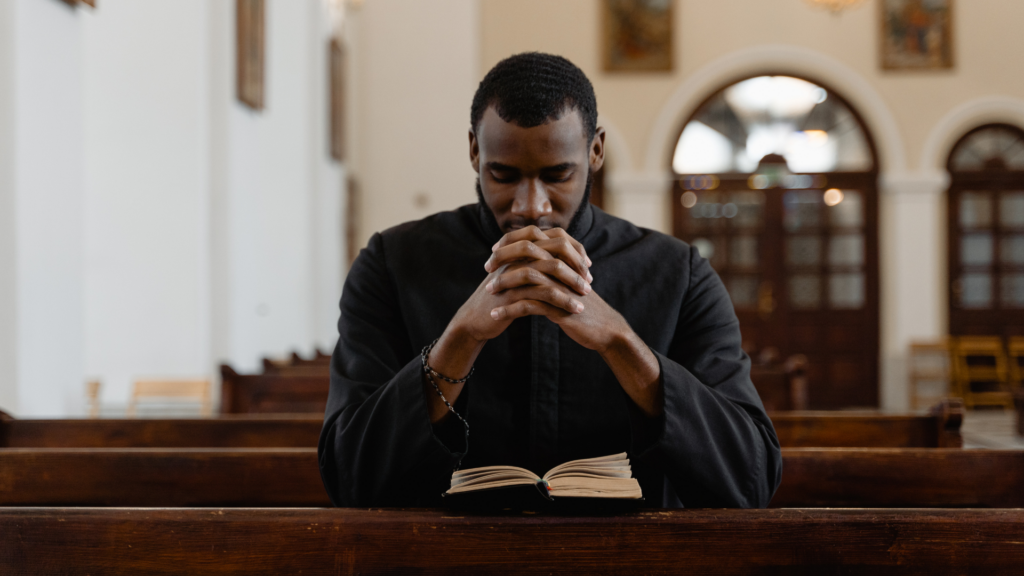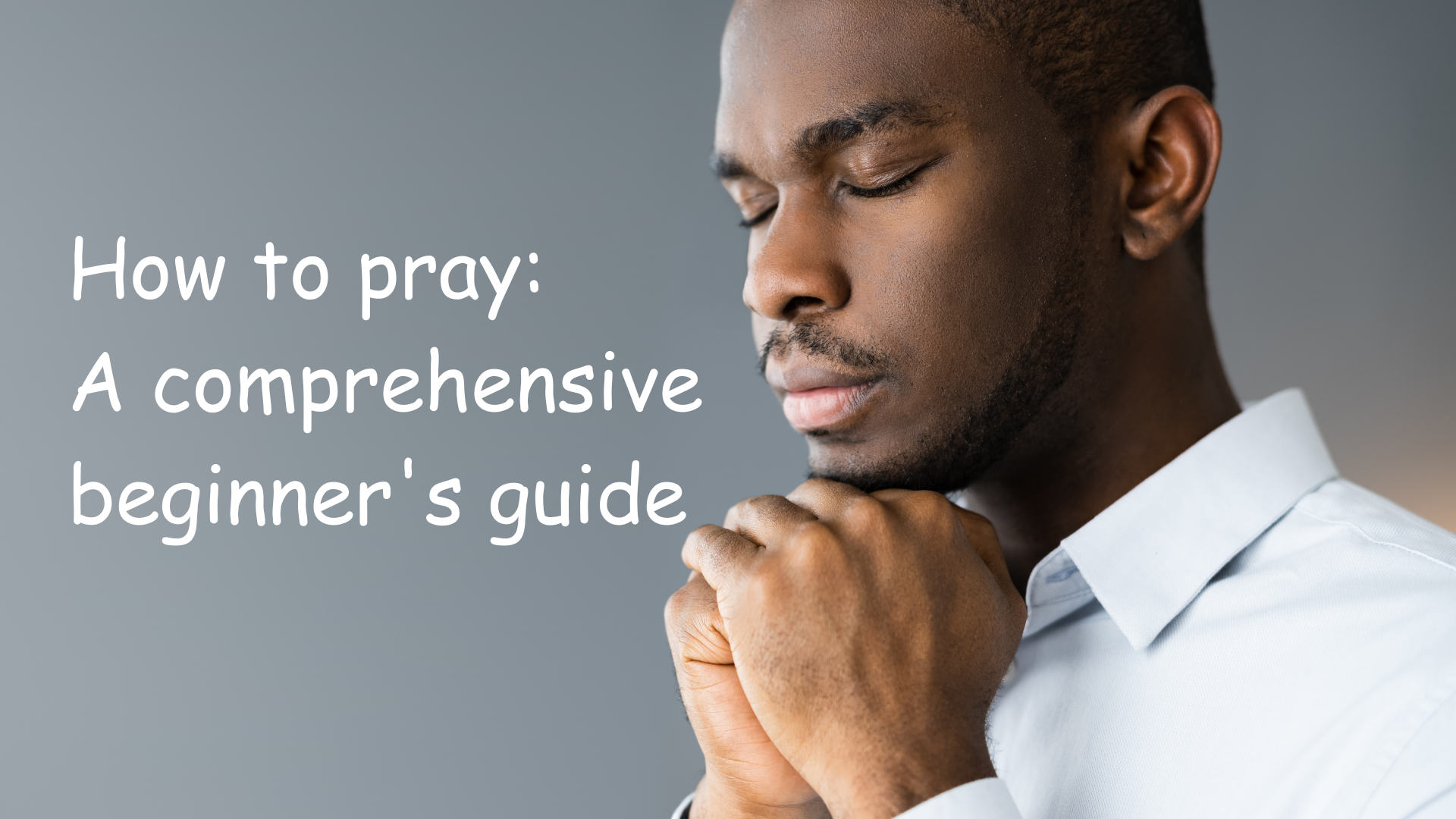For Christians seeking a deeper connection with God, understanding how to pray is essential. Whether you are just starting your journey with prayer or seeking to deepen your prayer life, I provide practical tips to help you enhance your relationship with God.
What is prayer?

Prayer is the heartfelt communication between you and your loving Heavenly Father. It goes beyond reciting words or going through the motions; it’s an intimate conversation with God, where you can share your deepest thoughts, joys, fears, and desires.
Prayer is a two-way street, where you speak to God, and He, in His grace, responds to you. It is a divine encounter that allows you to draw near to the Almighty and experience His presence in your life.
There was a time when I felt lost and confused, struggling with a difficult decision that had far-reaching consequences. Turning to God in prayer, I poured out my heart with sincerity. At that moment, I felt an overwhelming sense of peace and assurance that I was not alone in my journey.
Through prayer, I found the guidance and strength I needed to make the right choice. This experience reinforced the truth that prayer is not a religious practice but an intimate connection with the heart of God.
The importance of prayer as a way of communication with God

Prayer is not a one-sided monologue but a profound dialogue with the Creator of the universe. It is an act of faith, trust, and surrender; a way to submit your life before the Lord and acknowledge His sovereignty.
Through prayer, you acknowledge that you are dependent on God and His wisdom surpasses your understanding. As you pour out your heart to God, He listens attentively and responds according to His perfect Will.
It’s important to remember that God’s answers may not always align with your desires, but His ways are higher and better. He sees the bigger picture and knows what’s best for you, even when you can’t comprehend it at the moment.
A beautiful example of communication through prayer is seen in the life of Jesus. Before making significant decisions or facing trials, Jesus retreated to pray. One night, in the Garden of Gethsemane, Jesus prayed, “Father, if you are willing, remove this cup from me. Nevertheless, not my will, but yours, be done.” (Luke 22:42).
This moment of intimate communication with the Father demonstrates the depth of Jesus’ relationship with God and the surrender of His human will to the divine plan.
Different types of prayer

Prayer is not a rigid formula, it is diverse. For some believers, prayer may take the form of supplication, and for others thanksgiving. Here are the types of prayers you can engage in:
- Adoration: This form of prayer involves praising and worshiping God for who He is—His attributes, character, and majesty. It’s like a love letter to your Heavenly Father, acknowledging His greatness and expressing your awe and reverence before Him.
- Confession: Through confession, you humbly acknowledge your sins and shortcomings before God, seeking His forgiveness and cleansing. It’s an essential aspect of prayer that allows you to experience God’s abundant grace and mercy.
- Thanksgiving: Gratitude opens your heart to see God’s blessings all around you. Offering thanksgiving in prayer helps you cultivate a joyful spirit and reminds you of God’s faithfulness in both big and small things.
- Supplication: This form of prayer involves presenting your requests and needs to God, not just for yourself but also on behalf of others. It’s a beautiful act of interceding for loved ones, communities, and the world.
In my prayer journey, I’ve experienced the transformative power of these different types of prayers. When I focus on adoration, I’m reminded of God’s unfailing love, which strengthens my faith.
Confession allows me to experience the freedom of forgiveness and reconciliation with God. Thanksgiving opens my eyes to the countless blessings surrounding me. And supplication empowers me to be a vessel of God’s love and compassion for others.
1 Thessalonians 5:16-18 says “rejoice always, pray without ceasing, give thanks in all circumstances; for this is the will of God in Christ Jesus for you.” As you explore these different forms of prayer, remember that prayer is a personal journey no matter the form it takes.
Embrace each form and let your prayers flow naturally, authentically, and from the depth of your heart.
How to prepare for prayer

Before praying, it’s essential to create a conducive atmosphere for communion with God. Here are tips to enhance your prayer time.
Find a peaceful environment for prayer
Creating a conducive environment for prayer is like setting the stage for a heartfelt conversation with God. While prayer can happen anywhere, finding a quiet and peaceful space can enhance your connection with the Lord.
Look for a place where you can be alone, away from distractions. It could be a cozy corner in your home, a serene garden, or even a quiet spot in a nearby park. I remember the first time I dedicated a specific space for prayer.
I transformed a small corner of my room into a prayer nook with a table, chair, pen, notebook, and Bible. As I sat there, away from distractions, I felt God’s presence. The atmosphere became a sacred space where I could pour out my heart without reservation, knowing that God was listening attentively.
Set aside dedicated time for prayer

Life can be busy, and it’s easy for prayer to slip through the cracks amidst your daily responsibilities. However, setting aside dedicated time for prayer is crucial for nurturing a consistent and growing prayer life.
It doesn’t have to be a lengthy session; even a few minutes each day can make a significant difference. Consider integrating morning prayers into your daily routine. Whether it’s during your morning coffee, on your lunch break, or before sleeping, schedule a time that works for you.
Making prayer a priority shows God that you value your relationship with Him and desire to spend time in His presence. One inspiring example of prioritizing prayer is found in the life of Daniel.
Amidst a busy and challenging situation, “he got down on his knees three times a day and prayed and gave thanks before his God, as he had done previously.” (Daniel 6:10). Daniel’s commitment to prayer, even in the face of adversity, serves as an encouraging model for us to follow.
Eliminate distractions and focus the mind

Distractions are a common hurdle in prayer, but with intentional effort, you can overcome them. During your prayer time, turn off notifications on your phone, step away from screens, and create a space free from unnecessary interruptions.
When your mind starts to wander during prayer, gently redirect your focus back to God. It’s natural for thoughts to drift, but don’t be discouraged. Lift up those distractions to God in prayer, asking Him to help you center your mind on Him.
I struggled with distractions in prayer, especially when I began. But over time, I learned to embrace those moments as opportunities to draw even closer to God. I discovered that when I acknowledged those distractions and surrendered them to God, my prayer time became more meaningful and focused.
Remember, prayer is not about perfecting a technique but building a genuine relationship with God. It’s okay to stumble along the way, but with perseverance and trust, your prayer life will flourish.
Let’s analyze this Scripture: “But when you pray, go into your room and shut the door and pray to your Father who is in secret. And your Father who sees in secret will reward you.” (Matthew 6:6) This verse encourages believers to conduct their prayers in a quiet and private space, underlining the intimate aspect of talking God.
As you prepare for prayer, you open the door for a deeper communion with God. Let your prayer journey be characterized by authenticity, intimacy, and a heartfelt desire to draw near to the One who eagerly awaits your company.
How to develop a prayerful heart

Developing a prayerful heart is essential as it invites you to draw near to God, seek His guidance, and experience His unconditional love. Follow these tips to nurture a powerful prayer life:
Cultivate a spirit of humility and surrender
At the core of a prayerful heart lies a spirit of humility and surrender. Humility recognizes that you are wholly dependent on a mighty and loving God. It acknowledges that you need His guidance, wisdom, and grace in every aspect of your life.
On the flip side, surrender relinquishes your desires and will to God, trusting that His plans are greater than your own. One beautiful example of humility and surrender is found in the prayer of Mary, the mother of Jesus.
When the angel Gabriel announced God’s plan for her to give birth to the Savior, she humbly responded, “Behold, I am the servant of the Lord; let it be to me according to your word.” (Luke 1:38). Mary’s willingness to submit to God’s plan, even though it was beyond her understanding, exemplifies the kind of heart that God delights in.
As you cultivate humility and surrender in prayer, you open yourself to God’s transformative work in your life. Embrace vulnerability before Him, sharing both joys and struggles and experience the peace that comes from trusting in His divine wisdom.
Build a relationship with God through prayer

Prayer is not just a routine or a checklist; it’s the foundation of a thriving relationship with God. Just as any relationship requires time and effort, so does your relationship with your Heavenly Father.
Through consistent prayer, you develop a deeper intimacy with God, understanding His heart and aligning your desires with His. Imagine a close friendship: the more time you spend with someone, sharing experiences, thoughts, and feelings, the stronger the bond becomes.
Likewise, the more time you spend in prayer, pouring out your heart to God and listening to His voice, the more your love for Him deepens. In my own life, building a prayerful relationship with God has been transformative.
Regularly spending time in His presence has opened my heart to experience His unconditional love and grace. I’ve found solace in knowing that I can come to Him with all my joys and pains, trusting that He cares for me deeply.
Overcome doubts and misconceptions about prayer

Doubts and misconceptions about prayer are not uncommon, especially when you don’t see immediate answers or when you experience difficult circumstances. It’s essential to acknowledge these doubts and bring them to God in prayer.
In times of doubt, remember that prayer is not a transactional exchange; it’s about intimacy with God. He knows your needs even before you present them to Him (Matthew 6:8). Although you may not always understand His ways, you can trust that He works all things for your good (Romans 8:28).
Another misconception is that prayer is only about asking for things. While supplication is an important aspect of prayer, remember that it also includes adoration, confession, and thanksgiving. Embrace the fullness of prayer, and you’ll discover a well-rounded and enriching experience.
I once struggled with doubt, questioning if God was truly listening to my prayers. But as I delved deeper into Scripture and prayer, my perspective shifted. I realized that prayer is not just about getting what I want; it’s about knowing God and aligning my heart with His purposes.
Gradually, my doubts transformed into a growing confidence in His unfailing love and faithfulness. Philippians 4:6 says, “Do not be anxious about anything, but in everything by prayer and supplication with thanksgiving let your requests be made known to God.”
Through prayer, you lay your heart bare before God, trusting that He listens, loves, and responds with immeasurable grace. As you embark on your prayerful journey, hold onto these truths. God invites you into a relationship of trust and intimacy through prayer.
Embrace humility and surrender, allowing God to mold your heart. Spend time in His presence, building a beautiful and transformative relationship. And as doubts arise, lean on the promises of Scripture, knowing that God hears and cares for you beyond measure.
The Lord’s Prayer: A model for prayer

The Lord’s Prayer is a model for prayer given to us by Jesus. It guides believers in their conversations with God. Whether you are new to the faith or a seasoned follower of Christ, the Lord’s Prayer is a beautiful blueprint for approaching your Heavenly Father with reverence, adoration, and trust.
Exploring the Lord’s Prayer as taught by Jesus
When the disciples asked Jesus how to pray, He provided them with the perfect model—the Lord’s Prayer (Matthew 6:9-13). This prayer contains the essential aspects of communicating with God.
The Lord’s Prayer has been a guiding light for countless believers throughout history, including myself. It’s a timeless gift from Jesus that teaches us how to pray and approach God.
Understanding the components and significance of each line

In this exploration of The Lord’s Prayer, I’ll explain each line, uncovering its significance and the riches it holds for your prayer life. From acknowledging God’s holiness to seeking His Will in your life, this prayer highlights the importance of your relationship with God.
1. “Our Father in heaven, hallowed be your name”: The prayer begins with acknowledging God as your loving and Heavenly Father. It establishes your relationship with Him and reminds you of His holiness. By hallowing His name, you declare your reverence for God, recognizing His greatness and majesty.
2. “Your kingdom come, your will be done, on earth as it is in heaven”: This line aligns your heart with God’s purposes. You seek His Kingdom and Will above your own, surrendering to His divine plan. It’s an expression of trust, acknowledging that God’s ways are higher and better than yours.
3. “Give us this day our daily bread”: Here, you bring your needs before God, asking Him to provide for you daily. It’s not just about physical sustenance but also spiritual nourishment. You learn to depend on God for all aspects of your life.
4. “And forgive us our debts, as we also have forgiven our debtors”: This line emphasizes the importance of forgiveness. You confess your sins before God, seeking His mercy and grace. It also challenges you to extend the same forgiveness to others, fostering a heart of compassion and reconciliation.
5. “And lead us not into temptation, but deliver us from evil”: In this part of the prayer, you ask God for protection and guidance. You acknowledge your vulnerability to temptation and seek His help in staying on the path of righteousness.
Using the Lord’s Prayer as a guide in personal prayer

The Lord’s Prayer serves as a guide for structuring your personal prayers. It contains praise, surrender, supplication, and acknowledgment of your need for God’s wisdom and strength.
When I first started using the Lord’s Prayer in my personal prayer time, it revolutionized my approach to communing with God. It gave me confidence in knowing that I could pray with purpose and that I didn’t need to find the “perfect” words.
Each line of the Lord’s Prayer became a stepping stone, leading me deeper into a heartfelt conversation with my Heavenly Father. Incorporating the Lord’s Prayer into my daily prayers brought balance and intentionality.
It helped me remember to praise God, submit to His Will, present my needs, seek forgiveness, and embrace His guidance and protection. Using this model, I felt a closer connection with God, as if Jesus Himself was teaching me how to pray.
As you integrate the Lord’s Prayer into your prayer life, don’t feel confined to repeating it verbatim. Allow the essence of each line to inspire your own expressions of love and devotion. Use it as a springboard for exploring other areas of your heart, knowing that God longs to hear your unique voice in prayer.
Let’s meditate on the words of Jesus:

“Pray then like this: ‘Our Father in heaven, hallowed be your name. Your kingdom come, your will be done, on earth as it is in heaven. Give us this day our daily bread, and forgive us our debts, as we also have forgiven our debtors. And lead us not into temptation, but deliver us from evil.'” (Matthew 6:9-13)
Learning how to pray for beginners can be intimidating. Let the Lord’s Prayer be a guiding light on your prayer journey, leading you to a deeper and more intimate relationship with your Heavenly Father.
Use it to remind yourself that prayer is not a complicated routine but a heartfelt conversation with your Creator.
Embracing different prayer methods

Diverse prayer methods offer unique ways to express devotion, seek guidance, and experience God’s presence in profound ways. Here are some ways to pray you may want to try:
Praying with Scripture
Praying with Scripture is a powerful way to engage with God’s Word, allowing it to come alive in your heart and mind. One ancient practice that has impacted my prayer life is praying with Scripture.
It involves a deliberate and meditative approach to reading the Bible, enabling you to encounter God’s voice in a personal way. To practice this method, choose a short passage from the Bible and read it slowly and attentively.
Let the words wash over you, and be open to any verse or phrase that resonates with your spirit. As you read, reflect on the meaning of the text and how it applies to your life. Allow the Holy Spirit to speak to your heart through the Scriptures.
One of my most memorable experiences with Scripture praying was when I stumbled upon Psalm 46:10, “Be still, and know that I am God.” As I meditated on these words, calmness came over me. In that moment of stillness and reflection, I felt God’s presence like never before, assuring me of His sovereignty and unfailing love.
Journaling as a form of prayer and reflection

Journaling can be a beautiful way to engage in prayer and reflection. It provides a tangible space to pour out your thoughts, feelings, and prayers before God. There are no rules or restrictions—just an honest and open dialogue with your Heavenly Father.
As you write in your journal, share your joys, fears, gratitude, and petitions. Lamentations 2:19 encourages you to “pour out your heart like water before the presence of the Lord.” So, write down what’s in your heart without hesitation, knowing that God sees every word you pen.
Journaling can also serve as a record of your spiritual journey, allowing you to witness God’s faithfulness over time. I recall a time when I was going through a period of doubt and uncertainty. I began journaling my prayers, expressing my struggles and questions.
Over the weeks and months that followed, I witnessed how God answered my questions, providing clarity and peace in the midst of confusion. Looking back at those journal entries, I saw how God had been at work all along, guiding me through my doubts and leading me closer to Him.
Praying with music or through worship

Music has a unique way of touching your soul and drawing you into God’s presence. Incorporating worship songs into your prayer time can create a powerful atmosphere of adoration and surrender. As you listen to the lyrics and melodies, let the music become a prayer from your heart to God’s.
During moments of pain or struggle, I’ve found solace in worship songs that reflect God’s love and faithfulness. These songs became my prayers, expressing what I couldn’t find words for. Through music, I found comfort, strength, and renewed hope in God’s promises.
You don’t have to be a professional singer to learn how to pray through worship. You can listen, sing along, or hum and allow the music to lift your spirit as you pray. God delights in the sincere offering of your heart as captured in Psalm 98:4 – “Make a joyful noise to the Lord, all the earth; break forth into joyous song and sing praises.”
Incorporating these prayer methods into your prayer life can deepen your relationship with God. Each technique offers a unique way to connect with God, engage with His Word, and express your heart in prayer.
As you explore these approaches, keep in mind that prayer is a journey of intimacy with the One who loves you unconditionally.
Keys to effective prayer

Prayer is a powerful and intimate way of connecting with God. Here are practical tips to enhance your prayer life and make your conversations with your Heavenly Father more meaningful and impactful.
Be sincere and authentic in prayer
One of the most powerful aspects of prayer is its ability to connect you with God on a personal level. To experience the fullness of effective prayer, you must approach God with sincerity and authenticity. There’s no need for pretense or impressive words; God desires a genuine heart.
In my prayer journey, I’ve learned the beauty of being vulnerable before God. I used to think I had to sound eloquent or speak the right words in my prayers. But as I let go of the need to impress and embraced my authentic self, I felt freedom and closeness to God.
God already knows your thoughts and desires, so there’s no need to hide anything from Him. Psalm 139:1-2 says “O LORD, you have searched me and known me. You know when I sit down and when I rise up; you discern my thoughts from afar.”
Be honest, and share your joys and struggles plus doubts and fears. God longs for an intimate relationship with you, and authenticity is the foundation of that connection.
Seek God’s Will and guidance in prayer

Effective prayer involves aligning your desires with God’s Will. While it’s natural to pray for your own needs and desires, seeking God’s guidance helps you surrender to His divine plan, which is always for your ultimate good.
In times of decision-making, I’ve found comfort in seeking God’s Will through prayer. There was a significant career choice I had to make, and I battled with uncertainty. As I sought God’s guidance in prayer, I felt a gentle nudge in my heart, leading me down a path I hadn’t considered before.
Trusting His direction, I stepped out in faith, and it turned out to be a rewarding experience. The Bible encourages us to seek God’s Will in all areas of our lives: “Trust in the Lord with all your heart, and do not lean on your own understanding. In all your ways acknowledge him, and he will make straight your paths.” (Proverbs 3:5-6).
As you surrender your plans to God in prayer, you find peace and assurance in knowing that His wisdom surpasses your own.
Incorporate faith and trust in your prayer

Faith and trust are inseparable companions when it comes to prayer. When you pray, you are entrusting your needs and desires to a faithful and loving God. Having faith means believing that God hears your prayers and that He is capable of answering them according to His perfect timing and plan.
In my life, there have been moments when I’ve struggled with doubt and wondered if God was listening. Yet, as I leaned on the promises of Scripture and chose to trust, I witnessed God’s faithfulness unfold in ways I couldn’t have anticipated.
Jesus Himself emphasized the significance of faith in prayer: “Therefore I tell you, whatever you ask in prayer, believe that you have received it, and it will be yours.” (Mark 11:24). Our faith isn’t rooted in wishful thinking but in God’s character, who is faithful to His promises.
Trust in God’s goodness, even when circumstances seem uncertain. Trust that He knows what is best for you, even when His answers differ from your expectations. Embrace faith and trust as essential companions in your prayer journey, knowing that God’s plans are always more remarkable than you can imagine.
As you incorporate these tips into your prayer life, remember that effective prayer isn’t about following a formula but about drawing near to God with sincerity, seeking His Will, and placing unwavering trust in His goodness.
How to overcome challenges in prayer

At times, you may struggle with doubts, distractions, or even feelings of inadequacy in your prayer life. However, these obstacles shouldn’t hinder your connection with God. Try these strategies to cultivate a thriving prayer life during such moments.
Deal with distractions and wandering thoughts
Distractions and wandering thoughts are common challenges we all face in prayer. When distractions arise, don’t be disheartened; instead, use them as opportunities to refocus your heart on God.
In my prayer time, I often encounter distractions, especially when I’m going through a busy or stressful season. Rather than getting frustrated, I’ve learned to embrace those moments as reminders to surrender my worries to God.
When a distracting thought arises, I acknowledge it and offer it to God in prayer, asking Him to help me refocus on Him.
Colossians 3:2 is a relevant verse to meditate on during times of distraction. “Set your minds on things that are above, not on things that are on earth.” This verse reminds us to redirect our thoughts to spiritual things when praying.
Handle spiritual dryness and feeling distant from God

There may be seasons in your prayer life when you experience spiritual dryness or feel distant from God. It’s important to recognize that such times are normal and don’t indicate a lack of faith.
Instead of pushing these feelings away, acknowledge them before God with honesty. During a challenging time in my life, I went through a period of spiritual dryness. Prayer felt empty, and I wondered if God was even listening.
However, in the midst of my struggles, I found comfort in Psalms, where David expressed similar emotions. Reading those Psalms in my prayer time allowed me to connect with God, knowing that I wasn’t alone in feeling distant from Him.
Remember, even in times of dryness, God is still present and loving. The Bible assures us that God is near to the brokenhearted (Psalm 34:18) and that He will never leave nor forsake us (Hebrews 13:5).
Persevere in prayer during difficult times

Prayer is not a guarantee that your life will be free of challenges, but it is a lifeline that sustains you during difficult times. Persevering in prayer during adversity is an act of trust and surrender, believing that God is with you in the midst of your trials.
I once faced a daunting situation that seemed overwhelming. In my prayers, I repeatedly asked God for a solution, but it seemed as if my prayers were unanswered. Yet, as I continued to persevere in prayer, my perspective shifted.
I realized that God was using that difficult season to teach me valuable lessons about patience, trust, and reliance on Him. The Bible encourages us to be persistent in prayer: “Rejoice in hope, be patient in tribulation, be constant in prayer.” (Romans 12:12).
Like a plant that needs water and sunlight to grow, your faith is strengthened as you persistently seek God’s presence through prayer. During challenging times, remember that God is at work, even when you can’t see the immediate results.
Trust that He is guiding you through the storm and that His plans for you are good (Jeremiah 29:11). Challenges in prayer are a natural part of the journey.
Embrace distractions as opportunities to refocus your heart, be honest with God during seasons of spiritual dryness, and persevere in prayer, knowing that God is with you through every difficulty. Keep pressing on, for God is faithful, and He delights in your prayers.
How to pray for others

Praying for others is an act of love and compassion that extends beyond your own needs and concerns. It is an expression of selflessness, where you lift the needs of those around you to the throne of God.
The importance of intercessory prayer
Intercessory prayer is a precious gift you can offer to others. It’s an act of empathy that allows you to stand in the gap for those who need God’s intervention. Just as Jesus interceded for His disciples and all believers, you too can bring the needs of others before God.
In my life, intercessory prayer has played a significant role in supporting my loved ones during their struggles. There was a time when a close friend was going through a challenging health issue.
As I interceded on her behalf, I felt a deep sense of connection to her pain and burden. Though I couldn’t change her circumstances, knowing that I was lifting her up to God brought comfort to both of us.
How to pray for family, friends, and the community

- Pray with specificity: When praying for your loved ones or the community, be specific in your requests. It’s not about simply saying, “Bless them,” but rather seeking God’s grace for their specific needs. Ask God to provide comfort to those who are hurting, healing to the sick, guidance to those facing difficult decisions, and strength to those going through trials.
- Pray for spiritual growth: Beyond temporal needs, intercede for their spiritual well-being. Pray for God to deepen their faith, increase their love for Him, and grant them wisdom and discernment to walk in His ways.
- Pray for God’s Will: While we may have specific desires for our loved ones, we should pray for God’s Will to be done in their lives. Trust that God knows what’s best for them, even when we don’t understand His ways.
Here is a verse to guide your intercession: “The prayer of a righteous person has great power as it is working.” (James 5:16). Your prayers, offered with sincerity and righteousness, can have a powerful impact on the lives of those you intercede for.
The power of praying for those in need and in distress

Praying for those in need and distress is a tangible expression of God’s love and compassion. When you lift up the brokenhearted, the suffering, and the marginalized, you become vessels of God’s mercy and comfort.
I remember a time when a natural disaster struck a distant community, leaving thousands in distress. I couldn’t physically be there to help, but I turned to prayer, asking God to provide comfort, strength, and provision to those affected.
Through prayer, I felt a deep connection with people I had never met, realizing that we are all part of God’s global family.
Jesus exemplified the power of intercessory prayer. In the garden of Gethsemane, He prayed for His disciples and all believers, including us, saying, “I do not ask for these only, but also for those who will believe in me through their word.” (John 17:20).
His intercessory prayer paved the way for our salvation and serves as a model for our prayers for others. As you intercede for those in need, you become agents of hope and vessels of God’s grace.
Through your prayers, you participate in God’s redemptive work in the lives of others, trusting that He hears and answers your cries on their behalf.
1 John 5:14-15 says “And this is the confidence that we have toward him, that if we ask anything according to his will, he hears us. And if we know that he hears us in whatever we ask, we know that we have the requests that we have asked of him.”
May this verse inspire you to intercede boldly and faithfully, knowing that God hears and answers your prayers according to His perfect Will. Let your prayers be a source of comfort, hope, and transformation in the lives of those you lift up before God’s throne.
The place of gratitude and thanksgiving in prayer

Gratitude and thanksgiving in prayer are powerful expressions of your relationship with God. When you come before your Heavenly Father with a heart filled with gratitude, you acknowledge His goodness, love, and blessings in your life.
Giving thanks in prayer not only fosters a spirit of contentment and joy but also deepens your intimacy with God.
How to cultivate a grateful heart through prayer
Prayer is a gateway to cultivating a heart of gratitude. When you approach God with thanksgiving, you shift your focus from your wants and needs to His abundant blessings. Gratitude opens your eyes to the countless ways God’s love and grace surrounds you daily.
In my prayer journey, I’ve experienced the power of gratitude. There was a time when I was overwhelmed with anxiety and uncertainty about the future. But as I started incorporating thanksgiving into my prayers, I noticed a shift in my perspective.
I began to see the blessings and provisions that I had previously taken for granted. Gratitude brought a newfound sense of peace and contentment, knowing that God was faithful and caring for me in every season.
Recognizing and thanking God for His blessings

The more you practice gratitude in prayer, the more you become aware of God’s blessings, both big and small. Take a moment to reflect on your life and recognize God’s hand at work. Thank Him for the gift of life, for loved ones, for answered prayers, and for the strength to face challenges.
Remember the ten lepers in Luke 17:11-19? They cried out to Jesus for healing, and He healed all of them. However, only one returned to express gratitude. Jesus asked, “Were not ten cleansed? Where are the nine?” (Luke 17:17). This story reminds us of the importance of recognizing and acknowledging God’s blessings in our lives.
The transformative power of a thankful prayer life

A prayer life steeped in gratitude has the power to transform your attitude and outlook. It enables you to find joy in the midst of difficulties and to appreciate the simple pleasures of life.
Gratitude shifts your perspective from what you lack to what you already have, fostering contentment and trust in God’s provision. One way to incorporate thanksgiving into your prayer life is by keeping a gratitude journal.
Each day, write down the things you are grateful for, no matter how small they may seem. Over time, you’ll notice how your list grows, and your heart becomes more attuned to the abundance of God’s blessings.
The Bible reminds us to thank God no matter the circumstances: “Rejoice always, pray without ceasing, give thanks in all circumstances; for this is the will of God in Christ Jesus for you.” (1 Thessalonians 5:16-18). It’s not always easy to give thanks when life is challenging, but even in the midst of trials, you can find reasons to be grateful for God’s sustaining grace.
Cultivating a heart of gratitude through prayer is a transformative practice. As you thank God for His blessings, you develop a deeper awareness of His presence and provision. Let your prayer life be a continual outpouring of gratitude, and watch as it enriches your relationship with God.
Celebrating answered prayers and understanding God’s timing

In your journey of faith, you often seek answers to your prayers, hoping for God’s intervention. As you pour out your heart in supplication, you may wonder why some prayers are answered, while others seem unheard.
I’ll explore the beauty of surrendering to His timing and trusting that every answered prayer, whether swift or delayed, unfolds in God’s loving arms.
Understand God’s sovereignty and His answers to prayers

God’s sovereignty is a foundational truth that shapes your understanding of answered prayers and His timing. As you pray, you must remember that God sees the bigger picture—the beginning from the end—and He knows what’s best for you.
There have been times in my life when I prayed for a specific outcome, only to receive a different answer from God. At first, I struggled with disappointment and confusion, but as I leaned on God’s sovereignty, I began to see His wisdom in the situation.
He knew what was best for me, even if it didn’t align with my immediate desires. God’s answers to your prayers can be “yes,” “no,” or “wait.” His “no” is not a rejection but an invitation to trust His perfect plan. His “wait” teaches you to be patient and rely on His timing.
As you embrace God’s sovereignty, your prayers become an expression of surrender, aligning your will with His. Proverbs 19:21 highlights God’s sovereignty: “Many are the plans in the mind of a man, but it is the purpose of the Lord that will stand.”
Trust that God’s purposes will prevail, and His answers to your prayers are rooted in His unchanging love for you.
Practice patience and trust while waiting for God’s timing

Waiting for God’s timing can be challenging, especially when you want immediate answers. But patience and trust are essential virtues to develop in your prayer journey. I’ve learned the value of waiting on God’s timing.
There was a season when I prayed for a specific opportunity. However, God seemed silent, and the waiting felt agonizing. Yet, as I surrendered my impatience to Him, I found peace in trusting His divine timing. In due course, God opened unexpected doors that exceeded my initial desires.
In Psalm 27:14 the Bible encourages us: “Wait for the Lord; be strong, and let your heart take courage; wait for the Lord”. While waiting, cultivate an attitude of trust, knowing that God’s timing is perfect and that He is always working behind the scenes.
Listen to testimonies of answered prayers and God’s faithfulness

Testimonies of answered prayers are a powerful testament to God’s faithfulness. As you reflect on past answered prayers, you are reminded of God’s goodness and His willingness to move on behalf of His children.
Think back to moments in your life when God answered your prayers in ways beyond your expectations. Celebrate those victories and hold them close to your heart as you face new challenges.
One of my testimonies involved a financial struggle I faced. I prayed for a breakthrough, not knowing how it would come. In an unexpected turn of events, a friend reached out and offered help at just the right time.
God’s provision was timely and miraculous, reminding me of His faithfulness in every circumstance. The Bible emphasizes God’s faithful in Hebrews 10:23: “Let us hold fast the confession of our hope without wavering, for he who promised is faithful.”
God’s faithfulness is not limited to past experiences; it extends into the present and future. He remains the same yesterday, today, and forever (Hebrews 13:8). Understanding God’s sovereignty, embracing patience, and remembering testimonies of answered prayers are vital components of your prayer journey.
As you trust in His perfect timing and remain confident in His faithfulness, your prayers become an expression of deepening faith and dependence on the One who hears and answers you according to His plan.
The importance of keeping a prayer journal

A prayer journal invites you into a deeper and more intentional relationship with God. It’s a sacred space where you can pour out your heart, express your gratitude, and seek God’s guidance.
Benefits of keeping a prayer journal
Keeping a prayer journal is a beautiful way to document your conversations with God and experience the power of prayer in your life. A prayer journal:
- Enhances your awareness of God’s presence: Writing down your prayers helps you become more aware of God’s constant presence in your life. As you pour out your heart to Him on paper, you’ll begin to notice His gentle guidance and responses to your prayers.
- Deepens your intimacy with God: A prayer journal nurtures a more intimate relationship with God. It becomes a safe space to share your joys, fears, doubts, and dreams with Him, knowing that He listens and cares deeply for you.
- Helps you record God’s faithfulness: In your journal, you can document answered prayers and instances where God has shown His faithfulness in your life. Reflecting on these testimonies strengthens your faith and builds your trust in God’s unwavering love.
- Improves focus and consistency in prayer: A prayer journal helps you stay focused during prayer, preventing distractions and wandering thoughts. It also encourages regular prayer habits, fostering a consistent and fruitful prayer life.
How to start and keep a successful prayer journal

Starting and maintaining a prayer journal is simple and flexible. Follow these steps to get started:
- Select a journal: Choose a journal that suits your needs. It could be a beautiful leather-bound book or a simple notebook. What matters most is that it feels special to you.
- Set a time: Find a designated time in your day for prayer journaling. It could be in the morning to begin your day with prayer or in the evening to reflect on the day’s events.
- Begin with gratitude: Start your journal entries with expressions of gratitude. Write down three things you’re thankful for each day, acknowledging God’s blessings and provision.
- Pour out your heart: Use your journal as a place to pour out your heart to God. Share your joys, concerns, hopes, and dreams without reservation. Be genuine and sincere in your prayers.
- Document prayers and answers: Write down specific prayers and petitions, along with the date. As prayers are answered, record those moments, celebrating God’s faithfulness.
- Reflect and review: Take time to read through your previous entries occasionally. Reflect on how God has been at work in your life, and be encouraged by the progress of your spiritual journey.
Using the journal for reflection and growth in prayer

Your prayer journal can be a valuable tool for reflection and growth in prayer. Here’s how to maximize it:
- Identify patterns: As you read through your journal, you may notice patterns in your prayers and areas where you seek God’s guidance consistently. Identifying these patterns can help you recognize recurring themes in your life and where God may be leading you.
- Track spiritual growth: Use your journal to reflect on your spiritual growth and discern areas where you need to grow. Record insights from Bible study, sermons, or books that have impacted your faith.
- Write down verses and promises: Include relevant Bible verses and promises that speak to your heart. These can serve as anchors during challenging times and reminders of God’s truths.
- Write prayers of praise: Don’t solely focus on requests and needs in your journal. Write prayers of praise and adoration, praising God for who He is and all He has done.
Let Psalm 5:3 inspire your prayer journaling: “In the morning, Lord, you hear my voice; in the morning I lay my requests before you and wait expectantly.” May this verse inspire you to approach your prayer journal with expectation, knowing that God hears your voice and delights in your prayers.
Be sure to start and maintain a prayer journal to create a repository of your conversations with God and cultivate a heart of gratitude and trust in His loving guidance.
Embracing prayer as a lifestyle

Making prayer a lifestyle means inviting God into every aspect of your life, from the mundane to the extraordinary, seeking His presence and guidance in all you do. It’s not a spiritual discipline but an expression of your dependence on the One who listens, answers, and walks with you every step of the way.
Why you should embrace prayer as a lifestyle
Prayer is not an isolated activity; it is a way of life—a continuous conversation with God that weaves through every moment of your day. It’s not a fleeting moment or a desperate cry for help; it is a transformative lifestyle that enriches your connection with God.
It goes beyond the confines of religious practices and becomes a daily rhythm of communication with God. I’ve learned the beauty of living a prayerful life. It’s not about confining prayer to a specific time or place but embracing the reality that God is with us always, ready to listen and guide us.
As I integrated prayer into my daily routines, I experienced peace and contentment, knowing that God was walking with me no matter the situation.
Integrating prayer into your daily activities

Here are various occasions and different times of the day you can pray:
- Praying while traveling: Turn your commute into a time of prayer and reflection. Pray for safety on the roads and use this time to connect with God.
- Praying at work or school: Throughout your work or school day, take moments to pause and lift up concerns, decisions, and interactions to God.
- Praying during mealtimes: Use meal times as opportunities for thanksgiving and acknowledgment of God’s provision.
- Praying with family and friends: Incorporate prayer into your interactions with loved ones, sharing joys and concerns, and praying together as a community.
- Evening reflection: Take time in the evening to reflect on the day, express gratitude, and seek God’s guidance for the days to come.
- Praying in the morning: Begin your day with a prayer of gratitude and surrender, inviting God to lead and guide you through the hours ahead.
How prayer enhances the Christian journey

Prayer is an essential element in the Christian journey. Here is how it enriches your relationship with God and deepens your faith in Him:
- Fosters intimacy with God: Regular communication with God through prayer nurtures a deeper intimacy with Him. As you spend time in His presence, you learn to discern His voice and grow in your understanding of His character.
- Offers strength and guidance: Prayer provides you with strength during challenges and clarity in decision-making. The Bible assures us that God is our refuge and strength, a very present help in trouble (Psalm 46:1).
- Makes you surrender and trust: Through prayer, you learn to surrender your will to God and trust in His plans for your life. Jesus Himself prayed, “not my will, but yours, be done” (Luke 22:42).
- Nurtures gratitude and contentment: Prayer cultivates a heart of gratitude, reminding you of God’s blessings and sustaining grace. It helps you find contentment in every circumstance, knowing that God is in control.
- Makes you pray for others: Prayer enables you to intercede for others, lifting up their needs and concerns before God. By praying for others, you participate in God’s redemptive work in their lives.
- Results in transformation and growth: As you make prayer a lifestyle, you experience transformation and growth in your faith. Philippians 4:6 reminds us, “Do not be anxious about anything, but in everything by prayer and supplication with thanksgiving let your requests be made known to God.”
Prayer is not meant to be confined to a specific time or place but rather to infuse every aspect of your life. Integrating prayer into your daily activities enhances your Christian journey, drawing you closer to God, empowering you with strength and guidance, and fostering gratitude and contentment.
FAQs
How do I begin a prayer?
Begin by finding a quiet space and centering your thoughts on your connection with God.
What do you say during a prayer?
During prayer, you can share your thoughts, hopes, and concerns with God. You may ask for guidance, blessings, or strength, and also offer gratitude and praise.
What do I say first in prayer?
Begin by acknowledging the presence of God, using phrases like “Dear God,” “Heavenly Father,” or “Oh Lord.”
How do you lead a simple prayer?
Speak from the heart and express thoughts or requests briefly and sincerely.
How do I start praying in the Bible?
Begin by reading Biblical passages such as Psalms that guide you in connecting with God through prayer. You can also start with Matthew 6:9-13, where Jesus teaches the disciples the Lord’s Prayer.
What is an example of a good prayer?
Dear Heavenly Father, I come to you with gratitude for this day. Guide me in my decisions and grant me the strength to face challenges. May your love shine through me. In Jesus’ name, I pray. Amen.
Start and nurture a personal prayer journey
As you embark on your personal prayer journey, be patient knowing that prayer is a learning process, and God delights in your sincere efforts to connect with Him. Through prayer, you learn to trust in God’s goodness and sovereignty, finding comfort in His faithfulness even amidst life’s challenges. A deeper relationship with God awaits you through prayer.

I’m a devoted follower of Christ on a journey to share the profound love, faith, and hope found in our Savior. Through my writings, I aim to inspire, uplift, and encourage fellow believers as we walk together in God’s light. Join me in exploring the beauty of faith and discovering the richness of a life rooted in Christ. Want to connect with me? Follow me on Facebook and YouTube.




